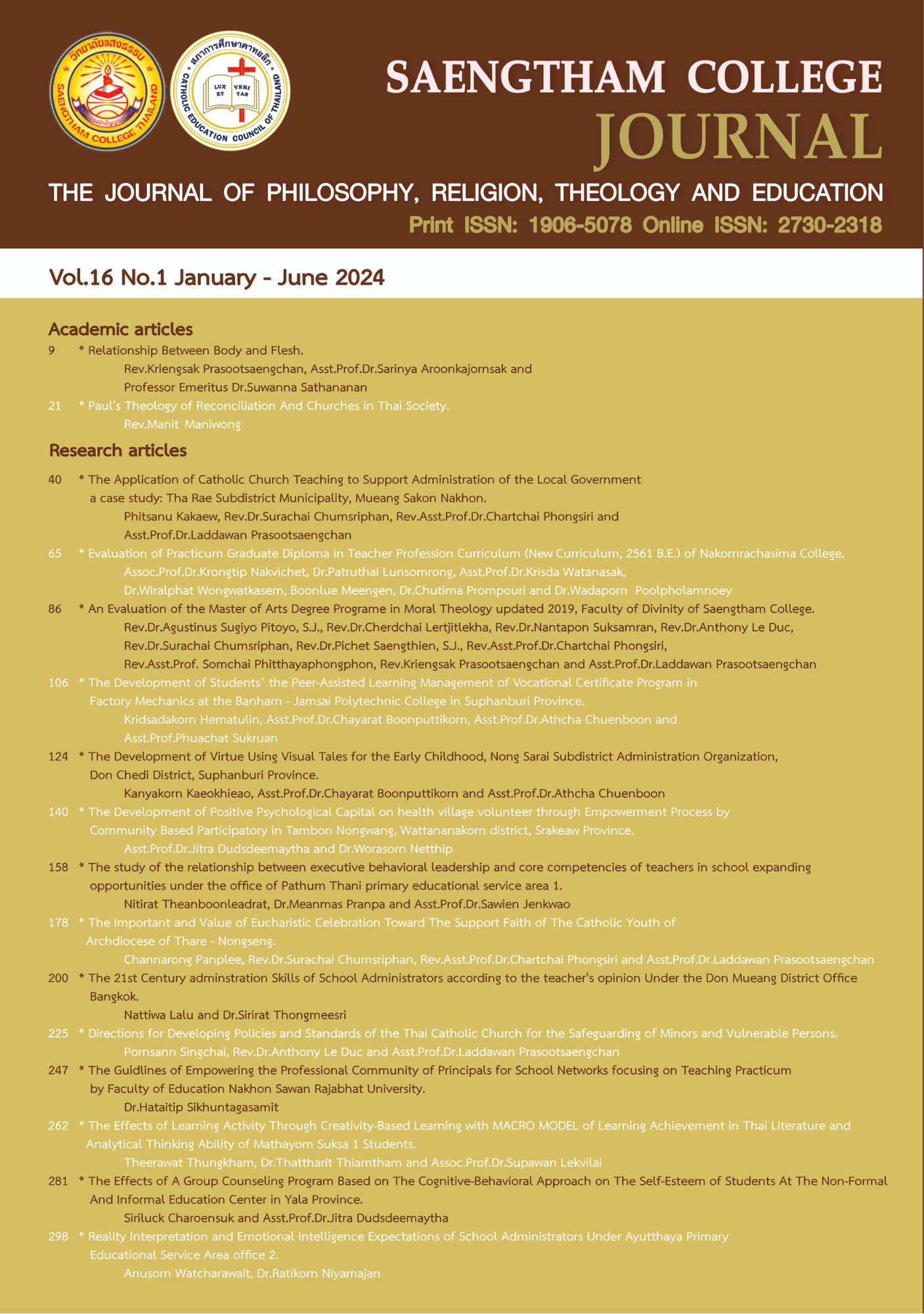Reality Interpretation and Emotional Intelligence Expectations of School Administrators Under Ayutthaya Primary Educational Service Area office 2
Main Article Content
Abstract
The purposes of the Independent Research were: 1) to study the reality of emotional intelligence of school administrators; 2) to study the expectations of emotional intelligence of school administrators; and 3) To compare the reality and emotional intelligence of school administrators. Emotional Intelligence Expectations of School Administrators Under the Phra Nakhon Si Ayutthaya Primary Educational Service Area Office 2, the population used in this study were 1,260 teachers. The sample group was calculated using Taro Yamane's formula, totaling 304 people. The questionnaire had a confidence value of 0.832. The statistics used in the research were percentage, mean, standard deviation and need assessment.
The results showed that 1) The reality of the school administrators as a whole It was at a moderate level in all aspects. Ranking average from highest to lowest were good ( = 3.09, SD = 0.33), skillful (
= 3.08, SD = 0.37) and happiness (
= 3.08, SD = 0.34), respectively) 2) Expectations. of school administrators as a whole It was at a moderate level in all aspects. Ranking averages from highest to lowest were smart (
= 3.24, SD = 0.34), good (
= 3.19, SD = 0.34) and happiness (
=3.11, SD = 0.35) respectively) and 3) when comparing The reality of emotional intelligence to administrators of educational institutions under Phra Nakhon Si Ayutthaya Primary Educational Service Area Office 2 found that there was a need for self-development in emotional intelligence of proficiency (PNI Modified = 0.052), followed by The next was the positive emotional intelligence (PNI Modified = 0.031), and the last was the emotional intelligence of happiness (PNI Modified = 0.010).
Article Details

This work is licensed under a Creative Commons Attribution-NonCommercial-NoDerivatives 4.0 International License.
- The academic and research articles, as well as the content and opinions expressed therein, published in Saengtham College Journal are solely the responsibility of the respective author(s).
- Articles published in Saengtham College Journal are the property of Saengtham College. Reproduction, modification, or dissemination of all or part of the content in any form without written permission from Saengtham College is prohibited.
- Articles published in Saengtham College Journal are protected under the Copyright Act.
References
กรมสุขภาพจิต. (2546). สุขภาพจิตไทย พ.ศ.2545-2546. กรมสุขภาพจิตกระทรวงสาธารณสุข.
กรมสุขภาพจิต. (2548). คู่มือความฉลาดทางอารมณ์. กรมสุขภาพจิต กระทรวงสาธารณสุข.
เจนวิทย์ จงใจ. (2558). ความฉลาดทางอารมณ์ของผู้บริหารสถานศึกษาขั้นพื้นฐานสังกัด สำนักงานเขตพื้นที่การศึกษาประถมศึกษากาญจนบุรีเขต 1-4 [วิทยานิพนธ์ปริญญามหาบัณฑิต ไม่ได้ตีพิมพ์]. มหาวิทยาลัยราชภัฏกาญจนบุรี.
ธัญญารัตน์ ทับทิม. (2557). ความฉลาดทางอารมณ์ของผู้บริหารสถานศึกษาและครูสังกัดสำนักงานเขตพื้นที่การศึกษาประถมศึกษาสิงห์บุรี [วิทยานิพนธ์ปริญญามหาบัณฑิต ไม่ได้ตีพิมพ์]. มหาวิทยาลัยราชภัฏเทพสตรี.
รดาการ ภูริพงษ์. (2558). ศึกษาความฉลาดทางอารมณ์ของผู้บริหารสถานศึกษาสังกัดสำนักงานเขตพื้นที่การศึกษามัธยมศึกษาเขต 35 [การค้นคว้าอิสระปริญญามหาบัณฑิต ไม่ได้ตีพิมพ์]. มหาวิทยาลัยสุโขทัยธรรมาธิราช.
รัฐธรรมนูญแห่งราชอาณาจักรไทย พุทธศักราช 2560. (2560, 6 เมษายน). ราชกิจจานุเบกษา: เล่มที่ 134, ตอนที่ 40 ก, 1-90.
สำนักงานเขตพื้นที่การศึกษาประถมศึกษาพระนครศรีอยุธยาเขต 2. (2561). ข้อมูลสารสนเทศ. สำนักงานเขตพื้นที่การศึกษาประถมศึกษาพระนครศรีอยุธยา เขต 2.
สำนักงานเลขาธิการสภาการศึกษา. (2560). แผนการศึกษาแห่งชาติ พ.ศ.2560 – 2579. สำนักงานเลขาธิการสภาการศึกษา กระทรวงศึกษาธิการ กรุงเทพมหานคร.
อรวรีย์ โคตรเคน. (2560). ปัจจัยความฉลาดทางอารมณ์ของผู้บริหารโรงเรียนที่ส่งผลต่อความสำเร็จในการบริหารงานโรงเรียนสังกัดสำนักงานเขตพื้นที่การศึกษาประถมศึกษากรมทหารราบที่ 6 ที่ปฏิบัติงานในเขตพื้นที่เขาพระวิหาร [วิทยานิพนธ์ปริญญามหาบัณฑิต ไม่ได้ตีพิมพ์]. โรงเรียนเสนาธิการทหารบก.
อวัสฎา นาโสก. (2560). ปัจจัยด้านความฉลาดทางอารมณ์ของผู้บริหารสถานศึกษาที่ส่งผลต่อประสิทธิผลการบริหารโรงเรียน สังกัดสำนักงานเขตพื้นที่การศึกษาประถมศึกษาสกลนคร เขต 3 [วิทยานิพนธ์ปริญญามหาบัณฑิต ไม่ได้ตีพิมพ์]. มหาวิทยาลัยราชภัฏสกลนคร.
Bachman, J., Stein, S., Campbell, K., & Sitarenios, G. (2000). Emotional intelligence in the collection of debt. International Journal of Selection and Assessment, 8(3), 176.
Bar-On. (2001). The Baron emotional quotient inventory. http//eqi.mhs.com. about.html.
Goleman, D. (1998). Working with emotional intelligence. Bantam.
Mayer & Cobb. (2000). Education Policy on Emotional Intelligence: Does It Make Sense?. Educational Psychology Review, 12(2), 163-183.
Sustainable Development Goals: SDGs 2030. (2024, 4 February). 2030 Sustainable Development Agenda. https://worldtop20.org/global-movement


